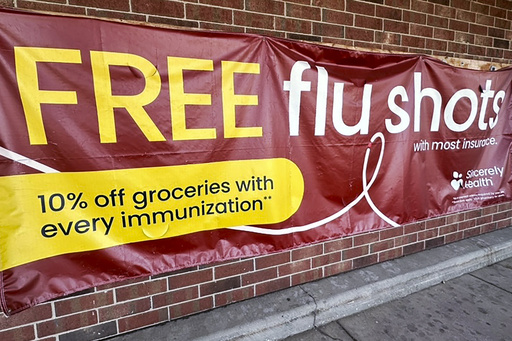
NEW YORK — The flu season in the United States has officially begun, with a notable surge in cases reported across many regions. Health officials highlighted a significant increase in various indicators, which include laboratory tests and emergency room visits, indicating alarming trends in flu-like illnesses.
According to Alicia Budd from the Centers for Disease Control and Prevention (CDC), the upward trend in flu cases has been consistent over the past several weeks. “It’s been increasing at a pretty steady pace now for the past several weeks. So yeah, we are certainly in flu season now,” Budd remarked. Currently, thirteen states have reported high or very high levels of flu-like illness, nearly double that of the previous week. Tennessee is among those states, particularly the Nashville area, which is experiencing a notable spike in illnesses. Dr. William Schaffner, an infectious diseases specialist from Vanderbilt University, noted, “Flu has been increasing, but just this last week has exploded,” adding that in a local clinic that monitors health trends, roughly 25% of patients show flu symptoms.
Louisiana is also identified as an early hotspot for flu cases. Dr. Catherine O’Neal from Our Lady of the Lake Regional Medical Center in Baton Rouge remarked on the situation, stating, “Just this week is really that turning point where people are out because of the flu.” Reports suggest that many parents are informing their employers about their inability to work due to flu symptoms and seeking flu testing for themselves and their children.
It’s important to highlight that several other viruses can cause symptoms similar to those of the flu, including COVID-19 and respiratory syncytial virus (RSV). The most recent statistics from the CDC indicate that COVID-19 hospitalizations have been on a decline since the summer, with current national activity categorized as moderate, though it remains high in the Midwest based on wastewater data. As for RSV, hospitalizations began to rise before the flu season kicked in, and there are signs that RSV may be leveling off, although it still outnumbers flu admissions in some areas.
The CDC’s declaration of the flu season is based on several key indicators, including laboratory results from hospital patients, data from doctor’s offices, and the rate of emergency department visits with a flu diagnosis. Currently, no particular strain of flu has been identified as dominant, and it is too early in the season to gauge how well the flu vaccine matches the circulating strains, according to Budd.
Last winter’s flu season was characterized as “moderate” overall, lasting about 21 weeks, with an estimated 28,000 flu-related fatalities. The season was particularly harmful to children, with a record 205 pediatric deaths reported. Budd noted that a lengthy flu season and low vaccination rates were likely contributing factors. Alarmingly, 80% of the children who died and were of vaccination age had not completed their flu vaccinations, as per CDC findings.
Vaccination rates among children emerge as a growing concern this year, as only about 41% of adults had received their flu vaccinations by early December, mirroring the same percentage from the previous year. Among children, the vaccination rate has decreased, with just 41% vaccinated this year compared to 44% last year. Additionally, COVID-19 vaccination rates are lower, with only 21% of adults and a mere 11% of children considered up to date with their shots.
Experts emphasize the importance of flu vaccinations, particularly with holiday gatherings approaching, where the risk of spreading respiratory viruses amplifies. Schaffner stated, “All those gatherings that are so heartwarming and fun and joyous are also an opportunity for this virus to spread person to person,” urging that it is not too late to get vaccinated.
Despite this, Louisiana’s health department announced that it is shifting away from promoting flu and COVID-19 vaccinations. An official indicated that individuals should consult their healthcare providers regarding the appropriateness of the vaccinations for their circumstances. Concerns about the safety and effectiveness of the COVID-19 vaccine have also been expressed by the state’s surgeon general, Dr. Ralph Abraham. However, public health advocates argue that such policies can have dire consequences. Jennifer Herricks, who leads Louisiana Families for Vaccines, warned, “People are going to die because of this policy.”

